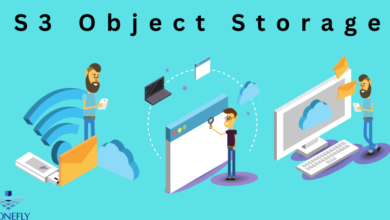Cloud-Based App Development: Benefits, Development Process and Cost
These days, cloud computing is all the rage in the corporate world. According to a number of industry estimates, performance and storage capacity are major concerns for more than 70% of digital workplaces as a result of the growth of corporate mobile applications. Cloud computing is the greatest potential strategy to address such issues.
Data collection is more convenient for enterprises thanks to cloud-based application development options. Furthermore, there is a greater degree of simplification in terms of management and security. Modern companies and corporations can construct productivity-based apps through cloud app development that improve customer experience and income. Furthermore, companies can invest in low-code app development through Cloud software development solutions, which is another efficient and affordable technique.
Not to forget the multi-experience cloud solutions bring to the business. Multi experience is the future of app development especially when deployed with technologies such as Cloud computing, IoT, AI/ML. Cloud computing offers conversational and seamless experience with mobile apps.
Businesses and corporations have many questions in light of the growing popularity and growth of cloud applications, especially with regard to the proper development of cloud-based apps.
Today, let’s discover those solutions! This post will discuss several cloud-based application solutions for your company, their potential advantages, and how to build a cloud application correctly.
What is a cloud-based application?
A cloud-based application is a programme that runs via the internet and has online storage and driving features, with some or all of the tasks being carried out by the cloud. In order to comprehend this in greater detail, consider the following: a user interacts with cloud-based applications via a web or mobile browser. Here, data processing is handled via an API and occurs on the distant server bae. The user’s device doesn’t affect the main operation; it just acts as an input device for the cloud app.
A web-based application and a cloud-based application are not the same. It is essential to examine some of the features that characterize cloud app development in order to comprehend its peculiarities.
Characteristics of a cloud-based application
- In cloud application development, the app’s data is saved in the cloud infrastructure and may be partially cached on the user’s device. This means that devices must meet certain minimal requirements to operate the application.
- Information can be temporarily stored by the cloud infrastructure on a user’s device so they can access it offline. The cloud app gets updated and uploads the created data from offline to the cloud storage location as soon as the user is back online.
- As a user, you can configure backup schedules, data optimisation, compression, and encryption in any way you see fit.
- A cloud application can be accessed using any internet-connected device, such as a desktop, tablet, or smartphone. This allows the user to become independent of browser capacities.
- Cloud-based applications provide access to third-party cloud consulting services via API integration and are more customisable than web apps.
Now that we’ve covered the characteristics that identify a cloud-based application, we can look at the many cloud options available to digital businesses and enterprises.
Types of Cloud-based solutions available for enterprises
Cloud computing solutions are made up of a variety of services and resources provided by third parties, including databases, data servers, storage, and so on. Cloud consulting services authorize computer reserves and infrastructure on a free or compensated basis. In summary, you can use the services, resources, and space without worrying about infrastructure maintenance.
There are four common types of cloud deployment available for businesses:
- Private cloud – This serves as a private web system, providing a secure environment for programmes, websites, and data. One corporation uses a private cloud service, which is not accessible to the public.
- Public cloud – Data in the public cloud resource can only be accessed with an authorized device. Typically, public clouds provide the most value and flexibility for data processing.
- Hybrid cloud – Hybrid cloud app development is regarded both public and private. You may distribute data between on-device services and third-party apps, as well as add more deployment and optimisation options.
- Community cloud – The deployment of community clouds is comparable to that of private clouds, with the exception that two or more organizations share data in this case. Community cloud is useful when a nation’s government has multiple internal departments that require the same resources and infrastructure.
You can leverage the above cloud deployment solutions for various application services.
Also Read: https://wingsmypost.com/the-future-of-mobile-app-development-with-blockchain-technology/
Benefits of using Cloud-based applications
Cloud application development is profitable for all enterprises and businesses since remote servers handle the majority of data storage and processing. Furthermore, cloud software development or cloud application development offers a number of unquestionable benefits, which are briefly discussed here.
Cost-saving
Cloud services only charge for the cloud space and feature sets that are required for your application development model. This pay-as-you-go model applies to all cloud deployment services, resulting in cheaper costs and better results.
Security
A cloud host’s full-time job is to monitor data security, which is far more efficient than a traditional in-house solution. Cloud software development also makes it easier to meet government security requirements. Furthermore, the cloud provides automated responses to upgrades and data recoveries.
Flexibility
Developing cloud applications provides more freedom than hosting on a local server. If you require additional bandwidth, cloud services can satisfy your needs immediately rather than going through a lengthy infrastructure upgrade.
Competitive edge and sustainability
A better customer experience is provided to the audience by cloud services that have been combined with AI technology, like chatbots and assistants.
The bank was able to handle 50% of customer queries with the use of conversational AI that was developed on the cloud, which resulted in a 20% reduction in labour costs. For contemporary businesses, this is a significant competitive advantage in addition to long-term sustainability objectives.
Mobility and insight
You may stay informed by using cloud application platforms to obtain information from any team, company, gadget, etc. The observation that businesses using cloud sharing services have higher employee satisfaction and engagement than nearby hosting enterprises is not surprising.
Personalized customer data insights can also be used in cloud-native application development to improve the speed and user experience of data access. Improved client data management and optimisation, as well as 85% more accessible data, were the results of the insights provided by the cloud analytic platform.
A varied range of solutions
Through the expansion of the business model’s service and resource offerings, cloud-based solutions maximize the contribution to the success of the organization. The cloud computing platform handles all of the solutions, including CRM and ERP.
Conclusion
Cloud-based app development offers scalability, flexibility, and cost-effectiveness. The streamlined development process and long-term cost savings make it an attractive option for businesses. Embracing cloud technology enables organizations to stay competitive, deliver innovative solutions, and maximize efficiency.



